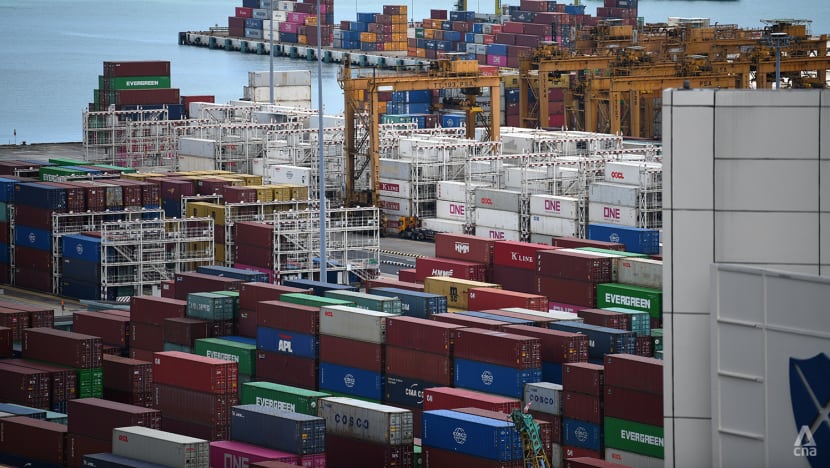Resilience, self-sufficiency important but world will be worse off if we go too far: Lawrence Wong

Shipping containers seen at PSA Tanjong Pagar Terminal. (File Photo: CNA/Calvin Oh)
SINGAPORE: Deputy Prime Minister Lawrence Wong on Sunday (Nov 13) said that resilience and self-sufficiency are important attributes, but added that the world will be worse off if countries go too far.
At the evening reception for participants of the 17th Asia-Pacific Conference (APK) of German Business, Mr Wong noted that part of the desire of wanting to have greater resilience is about having more reliable networks.
This, Mr Wong said, meant complying fully with all international rules and obligations.
"When the pandemic hit ... we never ever did any export controls from Singapore. We kept our ports open. We allowed goods to flow through Singapore even when we were short ourselves. And we think that's how we can build our credibility, our reputation as a trusted node in this network," he added.
Mr Wong was speaking in a fireside chat format, where he fielded a range of questions from a moderator.
.png?itok=Zxr_J-sx)
DANGERS OF DECOUPLING
China was one topic that he asked to give his views on, specifically, the issue of decoupling from China, in terms of technology and trade.
To this, Mr Wong referred to a piece written by German Chancellor Olaf Scholz before his recent visit to China. Mr Scholz had said that one should diversify if there are instances of critical one-sided dependencies, but that Germany should not decouple from China.
Mr Wong highlighted the integrated trade and supply chain linkages that Southeast Asian countries have with China and that nations should not be put in a position to choose between Beijing and Washington.
"Everyone feels that it will be a terrible outcome for ASEAN. If there is a line or even a hard wall drawn in ASEAN, dividing us into two camps," he said.
"The key, ultimately, of course, is how the US and China itself manage their relationship that's consequential and that will shape the tone for global affairs. And I think the good thing is that the leadership on both sides do not want a confrontation. They realise that there's so much at stake and everything to lose."
The two leaders - presidents Joe Biden and Xi Jinping - are due to meet face-to-face at the upcoming G20 summit in Bali, something Mr Wong hoped would help both sides establish a new "modus vivendi" on how to move forward.
CLIMATE GOALS
At the event, the moderator also brought up the issue of climate goals - and the oft-heard target of reaching net zero emissions by 2050 - and he asked if Singapore had a "more innovative, more original" answer.
"We will make it happen," came the reply from Mr Wong.
"We were not amongst the first (to commit to net zero by 2050) because we took a lot of time to study the pathways to get to net zero for Singapore and it's much harder for us. Imagine we have no ability to scale up renewable power in our little city. We can put solar panels on all the rooftops and available land in Singapore. It's still not enough," said Mr Wong.
"We studied very closely all the different technological options and in the end, we figured out that through a combination of different things whether by importing renewable power by using low carbon hydrogen, find a number of different options. We believe we have a pathway to get to net zero on top of that making sure that there is the right carbon price in Singapore."
Mr Wong also outlined three ways that Singapore is making green transition a gain, as opposed to a burden, for businesses.
First, by chasing opportunities in the low-carbon space such as energy efficiency, electric vehicles and cooling solutions.
He then highlighted Singapore's position as a transportation hub and the possibilities of green fuel - sustainable aviation fuels and low-carbon hydrogen for bunkering - in the aviation and maritime sectors.
And finally, Mr Wong spoke about the green finance space and the growing demand by projects around the region for transition finance.
SINGAPORE, GERMANY DEEPEN ECONOMIC TIES
The issue of sustainability was a key feature of an agreement that Singapore and Germany signed earlier in the evening.
The Germany-Singapore Framework for Sustainability and Innovation will "structure and deepen economic collaborations at the government-to-government, government-to-business and business-to-business levels", said Singapore's Ministry of Trade and Industry (MTI) in a press release on Sunday.
These collaborations will take place in sectors such as advanced manufacturing, mobility and green technologies.
The framework will also facilitate cooperation in areas such as business matching, networking and workplace training, said MTI.
The deal was signed by German Vice-Chancellor Robert Habeck and Singapore Minister-in-Charge of Trade Relations S Iswaran, who highlighted the broader significance of such an agreement.
"At a time when we're facing many headwinds in the global economy, it is important that like-minded partners continue to signal the commitment to greater integration economically," said Mr Iswaran.
"In this conference, the theme is on sustainability and diversification and one can only achieve the two through greater partnerships and broader partnerships."














